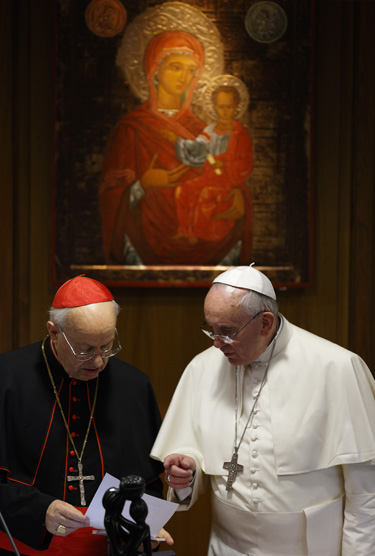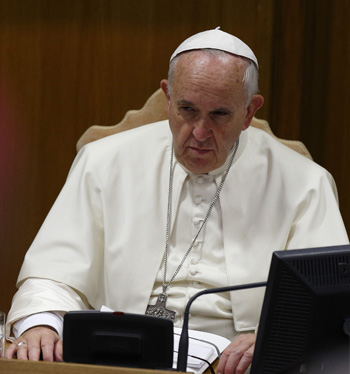
Pope Francis talks with Italian Cardinal Lorenzo Baldisseri, general secretary of the Synod of Bishops, during the morning session on the final day of the extraordinary Synod of Bishops on the family at the Vatican Oct. 18. (CNS photo/Paul Haring)
VATICAN CITY (CNS) — Even before the start of the Oct. 5-19 Synod of Bishops on the family, observers were likening it to the Second Vatican Council of 1962-65.
In both cases, an innovative and charismatic pope called an assembly in the first months of his pontificate, seeking to preach the Gospel in terms of contemporary culture and apply Catholic teaching with what St. John XXIII called the “medicine of mercy.”
As it turned out, history also repeated itself in the institutional dynamics of this year’s event, as bishops from around the world asserted their collective authority, leading the assembly’s organizers in Rome to revise some of their best-laid plans.
[hotblock]
A classic history, “The Rhine Flows into the Tiber,” recounts the first tumultuous week of Vatican II, when bishops rejected the Vatican’s handpicked candidates for the commissions that would write the council documents.
“It was not a revolutionary act, but an act of conscience, an act of responsibility on the part of the council fathers,” recalled Pope Benedict XVI in 2013. Then-Father Joseph Ratzinger attended Vatican II as a theological adviser to Cardinal Josef Frings of Cologne, Germany, one of the leaders of the bishops’ resistance.
More than 50 years later, bishops at the synod on the family reacted strongly after the Oct. 13 presentation of an official midterm report by Hungarian Cardinal Peter Erdo of Esztergom-Budapest.
Cardinal Erdo’s report, which was supposed to summarize the assembly’s first week of discussions, made headlines with its strikingly conciliatory language toward people with ways of life contrary to Catholic teaching, including divorced and remarried Catholics, cohabitating couples and people in same-sex unions.
Immediately after the cardinal spoke, 41 of the 184 synod fathers present took the floor to comment. A number objected that the text lacked certain necessary references to Catholic moral teaching, particularly regarding homosexuality and cohabitation. Bishops also remarked on the midterm report’s scarce references to the concept of sin.
“Three-quarters of those who spoke had some problems with the document,” Cardinal George Pell, prefect of the Secretariat for the Economy, told Catholic News Service. He called the report tendentious, skewed and without sufficient grounding in Scripture and traditional doctrine.
At a news conference Oct. 13, Cardinal Erdo distanced himself from the midterm report, identifying Italian Archbishop Bruno Forte of Chieti-Vasto, the synod’s special secretary, as responsible for a particularly controversial passage on same-sex unions.
[hotblock2]
Later that afternoon, the synod fathers divided into 10 working groups to discuss the midterm report and suggest amendments for the synod’s final document.

Pope Francis listens during the morning session on the final day of the extraordinary Synod of Bishops on the family at the Vatican Oct. 18. (CNS photo/Paul Haring)
The midterm report was “seen by many as not being as balanced as it should have been,” Cardinal Donald W. Wuerl of Washington told CNS.
Cardinal Wuerl, one of 11 members of a team that drafted the synod’s final report, said one common objection was to the theological concept of “graduality,” which the midterm report used, among other ways, to suggest the positive value of “irregular” relationships such as cohabitation.
“You don’t see that in the final document because the small language groups said, ‘Yes, it was said, but it didn’t garner support,” the cardinal said.
The synod’s leadership, under Cardinal Lorenzo Baldisseri, who served as general secretary, planned not to publish the working groups’ individual reports but provide them only to the drafters of the final report, along with their approximately 450 suggested amendments.
But on Oct. 16, the bishops insisted that the working-groups’ reports be made public.
“We wanted the Catholic people around the world to know actually what was going on in talking about marriage and the family,” Cardinal Pell said.
On the same day, the drafting committee was expanded to increase its geographic diversity, with the addition of Cardinal Wilfrid F. Napier of Durban, South Africa, and Archbishop Denis Hart of Melbourne, Australia. Just as bishops from a cluster of northern European countries had been leaders of change at Vatican II, some of the more outspoken synod fathers this year were from the English-speaking countries and Africa.
The synod’s final report, which the pope ordered published almost immediately after the assembly finished its work Oct. 18, featured many more citations of Scripture, as well as new references to the Catechism of the Catholic Church and the teachings of Blessed Paul VI, St. John Paul II and Pope Benedict XVI.
Synod fathers voted on each of the document’s 62 paragraphs. All received a simple majority, but three — on especially controversial questions of homosexuality and Communion for the divorced and civilly remarried — failed to gain the two-thirds supermajority ordinarily required for approval of synodal documents.
“What I think Pope Francis succeeded in doing was letting the synod fathers, letting the synod participants, actually come to a real consensus, even though it’s a weak consensus in some areas,” Cardinal Wuerl said. “The process worked, even though there were bumps along the way.”
PREVIOUS: In Turkey, pope will tour crossroads of Christian Europe and Muslim Middle East
NEXT: Family synod came to ‘real consensus,’ Cardinal Wuerl says



I feel the issues that were addressed at the synod were all legitimate and important issues. But what I feel should be addressed also as important is the way the church is going in the faith of the church. We need more priest, nuns who were the backbone of teaching of religion and passing on the faith. With so many churches closing for honest reasons it has split people from the faith. Some communities that were in existence for many years have been closed and for honest reasons some not for honest reasons but monetary. I love the church and have been actively involved for over 50 years. I have received awards from the diocese for my lay involvement. Hopefully and prayerfully bringing children and families closer to God. But what I see is a failing of warmth in some churches where some priest act like they are God with no compassion and driving some away from God and church. That time when a priests word was God is gone people are more intellectual and need a truly Christ like attitude. They need to show compassion and love as He did. I know it can be difficult at times for us as humans. But the Pope, Cardinals, Bishops and especially the priests “the church” are the shepherds that bring us all into the flock.
Of course thank God there still are so many wonderful priest. We need strength in our faith and the church again. With all the bad publicity and shame that has been exposed and associated with the church. The church needs to build up the faith to the people again. I don’t know where the answer lies but I do see a void in people and a loss of faith. We are becoming a secular people. We need to bring back the respect and love of God in our lives as it was. This I feel is a very important issue from what I have experienced over the years. Some have left the faith and joined other faiths. Some have gone to other churches because of a few hostel priest and the closing of the communities that was home for them for many years. My prayer is we must survive as a people of God. You can see what is happening around the world, the hostility, murders, violence, lack of Christianity and faith in God.
Prayerfully in Jesus,
Peter J. Pepe